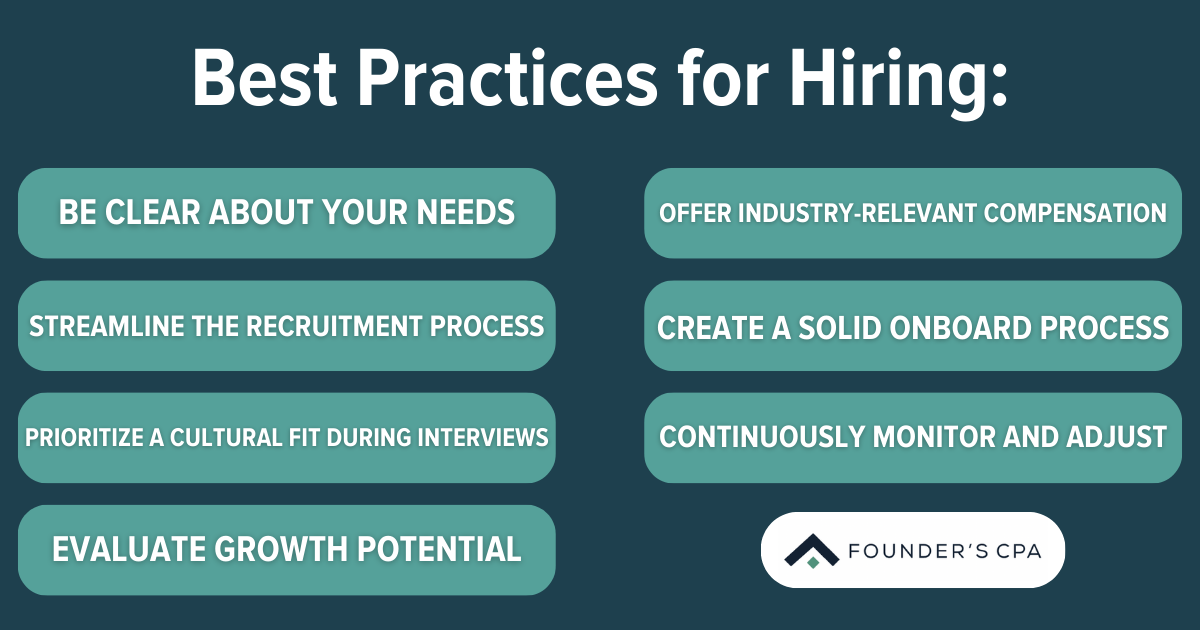
Startup growth can have many meanings. Although a startup’s growth trajectory often refers to sales, strategic hiring turns more revenue into long-term success. Following proven best practices for hiring ensures you’re hiring top talent that fits your business.
Humans play a pivotal role during growth by aligning business objectives with long-term goals. A potent hiring process raises the startup’s employer brand and gives you access to a deep talent pool for better dynamics in the work environment.
This article breaks down how your team catalyzes your startup’s success. Keep reading for the seven best practices for hiring in your startup.

Follow These Best Practices for Hiring
Many view hiring with trepidation. Although there’s wisdom in hiring slowly (and firing fast), fear of making the wrong hire shouldn’t prevent you from growing your team. The best practices below can help you get growth right.
1. Be Clear About Your Needs
An effective hiring strategy calls for startups to establish their needs. What are your current strengths and weaknesses? Identify the gaps in your startup’s talent pool that demand the most attention.
Then, pinpoint specific roles and skill sets that address these shortcomings. Startups often have particular needs to address, including operations manager, developer, innovator, marketer, and money manager.
Top skills to look for include:
- Adaptability
- An entrepreneurial mindset
- Agility and resilience
- Collaboration
- Team-focus
You can outline a clear job description to attract potential candidates based on these traits and tendencies. Clearly define the role of potential candidates and how they can work to meet expected goals. Your job posting can also indicate the company’s mission, culture, and work environment.
2. Streamline the Recruitment Process
Recruiting can feel like a nightmare for employers and candidates due to its length, complexity, and the non-zero chance of getting it wrong. Streamlining the recruitment process calls for strategic approaches that employ technology to screen resumes and provide an initial assessment. These efforts save time while increasing the odds of success.
Professional networks can be a goldmine for finding qualified candidates. Tap into your teams’ existing network while actively engaging referral networks to get suitable candidates. This technique expedites the hiring process while fostering a pool of talent vetted via trusted sources.
3. Prioritize a Cultural Fit During Interviews
A comprehensive interview involves key team members assessing whether the potential candidates fit into the startup’s culture and can provide a thorough exploration of the candidate’s character. Besides technical skills, the interviews should address:
- Personal qualities
- Collaborative tendencies
- Communication skills
Each potential candidate should directly align with the startup’s values and mission. This approach to team growth fosters a cohesive and unified organizational culture that prioritizes cultural fit. It’s a collective commitment for the hiring team to ensure new hires abide by the startup’s ethos.
Technical skills can be learned or trained. Cultural fit is more challenging to change.
4. Evaluate Growth Potential
Your startup’s future success depends on the growth potential of the team. Understanding the candidate’s mindset on growth will help you determine fit. The candidate must convey a mentality that embraces challenges and a commitment to ongoing development.
Evaluate whether these candidates can handle the dynamic work environment. Are they adaptable, resilient, and problem-solving? The evaluation process extends beyond past experiences. It focuses on the capacity to evolve within the startup.
5. Offer Industry-Relevant Compensation
Startups often face challenges in designing compensation packages to attract and retain employees. Industry-standard benchmarks can help you to establish a competitive and fair compensation package.
Offering a lower wage than your competitors makes it harder to compete for top talent, but remember your cash constraints.
An experienced accountant can leverage their expertise to help align your compensation with the market AND your budget.
6. Create a Solid Onboard Process
A new company can feel overwhelming to even the most capable hires. A thorough onboarding process helps acclimatize new employees to the work environment. It ensures they integrate well into your startup’s culture and become effective contributors.
The process can build confidence quickly with new team members and help them adjust to their new roles. The faster new employees get up to speed, the sooner they contribute to the startup’s growth.
7. Continuously Monitor and Adjust
Effective management involves continuous monitoring and adjusting to new market dynamics. Implement performance metrics for new candidates while creating benchmarks aligning with the startup’s goals.
Review metrics regularly while objectively assessing outcomes and seeking feedback. The insights derived help optimize the hiring process’s efficiency and effectiveness and ensure that the hiring process evolves with the company.

Receive the Best Results with the Best Practices for Hiring
Strategic hiring means getting the right team members on board that aligns with your startup’s goals. Following best practices for hiring can reduce the number of mistakes and increase your likelihood of success.
Founder’s CPA understands that a successful hiring process requires an in-depth analysis of potential candidates to get the right talent pool. Our financial expertise can help startups formulate a cohesive, capable team that drives success and fits the company budget. Contact us at Founder’s today to get started implementing the best practices for hiring at your startup.

